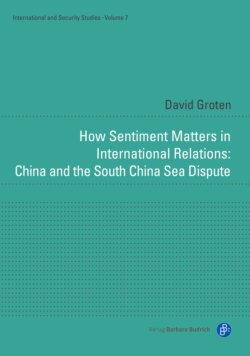Читать книгу How Sentiment Matters in International Relations: China and the South China Sea Dispute - David Groten - Страница 19
На сайте Литреса книга снята с продажи.
2.2 The Hypotheses
ОглавлениеAs discussed previously, the project accedes to the constructivist and social psychology argument that states’ policy preferences, or role performances46, are shaped by the interplay between self-conceptions and the perception and assessment of external conduct. Accordingly, the main focus of analysis rests on China’s self-evaluation, its assessment of other SCS stakeholders’ conduct and cognitive effects and policy preferences resulting thereof. As such, it is interested in whether or not external behavior, from a Chinese perspective, takes into adequate consideration Beijing’s self-worth conceptions. Such adequate consideration is regarded as respect, the independent variable of this project. Similarly, it intends to scrutinize as to whether the presence or absence of such disrespect experiences can account for Chinese foreign policy preferences (dependent variable) in response to U.S. and Philippine conduct in the SCS region. In order to structure the process of the analysis, three hypotheses are derived from the project’s theory-guided variables and are intended to provide concise answers to the superordinate research question. In the following, these hypotheses are adumbrated in consecutive order.
